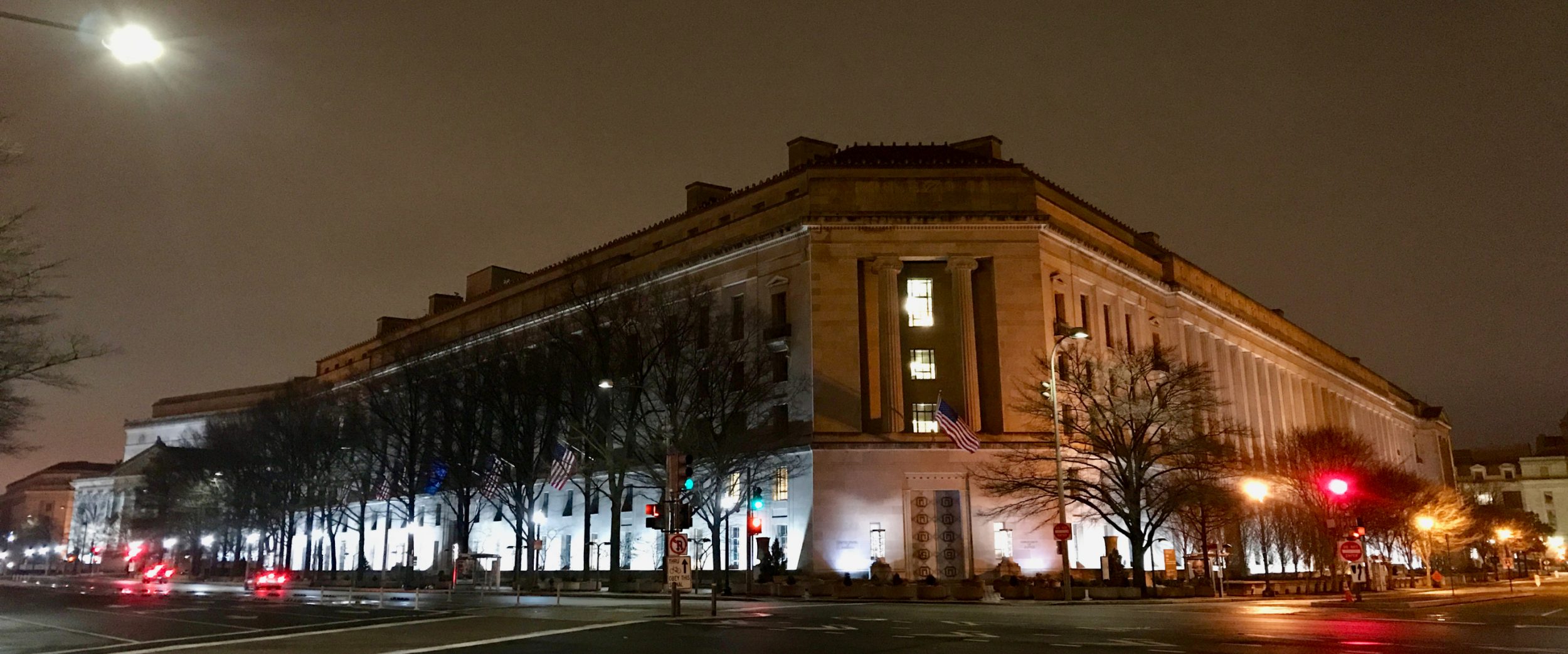For an administration that promised to fix longstanding problems in criminal justice that have driven over-punishment and mass incarceration, the Biden administration has largely ladled out a string of disappointments: pursuing the death penalty even after condemning it, federalizing gun cases to get longer sentences, and choosing to continue the use of counter-productive drug schedules, even while (properly) supporting the equalization of crack and powder cocaine sentences. Through it all, it has already become clear that criminal justice policy in this administration will largely be driven by the United States Department of Justice, and that’s a problem. History — right up to these recent decisions — tells us that so long as this is true, broad and systemic reform is likely impossible.
If there is one tragic constant about the Justice Department, no matter which administration is in power, it is this: DOJ is bold in the easy job of locking people up and timid in the more difficult task of crafting alternatives to brute-force incarceration. Consistently, DOJ fights common-sense reform, maintains a stranglehold on access to the rusted levers of change, and resists second-guessing its decisions. Asking DOJ to do better has not worked, no matter who has occupied the top appointed positions there. It is not a question of getting the right people in place in positions of power. It is, instead, a fundamental issue of institutional failure that requires fundamental institutional reform. It is time to limit the breadth of the Justice Department to its core prosecutorial functions and to develop broader governmental institutions to address other functions now under its awkward, too-large umbrella.
DOJ fights common-sense reform, maintains a stranglehold on access to the rusted levers of change, and resists second-guessing its decisions.
Rachel barkow & Mark osler
When you put DOJ in charge of criminal-law reform — of whatever type — you are putting prosecutors in charge. So the first question you have to ask is whether prosecutors will be good at the tasks you are asking them to accomplish. If you are asking them to roll back tough sentences or limit their own authority, it is easy to understand why prosecutors will struggle to be objective. The profession draws those who are inclined in favor of law enforcement, of course, but that isn’t the whole of it. There is also a certain emotional commitment that comes from seeking convictions and sentences — and a very real moral cost for having been wrong. There is also a distance between prosecutors and the people whose lives they are affecting. Prosecutors don’t interact with the accused other than in the process of accusation; other than what may be in a presentence investigation report (largely made up of information provided by the prosecution), they have little or no exposure to that life beyond its worst moment. Without being proximate to all the hardships in someone’s life, it is easy to see crime and punishment as abstract and to lose sight of what happens to someone after convictions and sentences. To the extent prosecutors get close to these issues, it is by being part of an insular circle with other prosecutors and investigators. That is not a vantage point that is going to give current practices the kind of critical assessment they need for reform to take hold.
“But the DOJ can do better with the right people!” some might object. This is belied by decades of harsh DOJ practices under presidents of both parties. Consider one particularly shocking data point: Between March 2020 and April 2021, a period spanning both the Trump and Biden administrations, 30,969 people in federal prisons asked for compassionate release under a program directed to a broad swath of conditions and situations. This was, of course, during an unprecedented pandemic in which there was a moral imperative to shrink prison populations to allow for social distancing and the saving of lives both inside and outside of those prisons. Amid that emergency, the DOJ-controlled Bureau of Prisons approved only 36 of those requests. Thirty-six of 30,969 is a terrible record from a pool that almost by definition contains multitudes of people for whom compassion would be justified, including 629 people who were terminally ill. DOJ simply could not bring itself to support freedom, even for those about to die. While some might object that the Biden administration will eventually do better and is just getting started, you can look to the Obama administration to see a similarly shameful record of compassionate release grants.
To get to real justice, we have to stop depending on the department bearing that name.
DOJ’s record on compassionate release is not an outlier. You see the same patterns across DOJ decisionmaking. Compassionate release, for example, is just one of several “second-look” mechanisms administered poorly by DOJ. Justice in the United States is supposed to allow people a second look at their conviction and sentence — it is right there in the Constitution, through the pardon power — but literally every existing second-look mechanism is routed in one way or another through DOJ. Even when President Obama tried to make clemency work and solicited petitions, he relied on the department (through the Office of the Pardon Attorney and the deputy attorney general) to evaluate cases. While the Obama administration focused on the large number of commutation grants (more than 1,700) relative to the embarrassing paucity of prior recent presidents, they ignored an even more historic set of denials. The Obama DOJ denied more requests than the previous five presidents combined. To put it another way, in one mad rush, Obama rejected more petitions than had been denied in the previous 32 years. Even at that, he left a historic number of petitions, over 11,000, for the next administration to deal with. Too much was left on the table.
Looking at this, one easy answer in an age of mass incarceration emerges: responsibility for second-look mechanisms needs to be divested from DOJ. To get a glimpse of how productive that might be, compassionate release provides a good example. While DOJ approved only 36 petitions, a new mechanism in the 2018 First Step Act allowed prisoners to go around DOJ and to the courts after the department rejected their claim. During the same time that DOJ voted “no” nearly every time, federal judges — not a particularly anti-carceral group — voted yes on 3,184 cases. If we take that power away from DOJ, good things can happen.
The argument is not that dissimilar from calls advocates have recently made to transfer responsibilities that have been given to police to other actors better equipped to handle them. Over time, police have been asked to address mental health crises, troubled students in schools, and traffic enforcement. But there are better actors to address all of these functions that do not bring the baggage — sometimes tragically violent baggage — that police bring. They see the world from a particular perspective that colors everything they do. The same is true of prosecutors. Asking them to handle second-looks of unduly harsh sentences is asking the wrong actor. They are biased by their initial decision and the natural defensiveness that results. But even more fundamentally, they bring a worldview that is divorced from the question they are being asked to answer. They are not experts in medical care or public health — the issues that often underlie compassionate release. They are not experts in rehabilitation — a key question in clemency. There are better actors to address those questions than prosecutors.
Another role unwisely delegated almost entirely to DOJ is advising the president on criminal justice issues. Imagine that, right now, in Iowa a candidate were beginning her run for the presidency. Looking out at the crowd in a diner, this candidate announces that if she wins, then she will only take advice on criminal justice issues from the nation’s federal public defenders. That would likely spell the end of her campaign; no reasonable candidate would limit themselves to one side in such a way. And yet we do exactly that as a matter of course, as DOJ has a near-monopoly on advising the president on criminal justice reform.
The results of this shortsightedness are predictable. You need look no further than the way in which the Obama DOJ stood in the way of the elimination of mandatory minimum sentences or forensic science reform. DOJ’s advice on these fronts was to do what benefitted DOJ. Mandatory minimums help prosecutors get pleas and cooperation, so DOJ resisted change even though mandatory minimums lead to gross racial disparities, do not improve public safety, and ruin lives needlessly. Similarly, even though scientific experts urged forensic science reform, DOJ did not want to make changes that would make it harder for them to win cases. This is not an independent advisor balancing all interests. DOJ is an interested lobbyist looking out for its own institutional interests above all others.
DOJ is bold in the easy job of locking people up and timid in the more difficult task of crafting alternatives to brute-force incarceration.
To get to real justice, we have to stop depending on the department bearing that name. Instead, compassionate release should just go to judges, and clemency handled by an independent board. The Bureau of Prisons could even be transferred to the Department of Health and Human Services. There should also be a cabinet or sub-cabinet-level independent advisor on criminal justice who is not tied to DOJ, just as there is a national security advisor outside of the national security apparatus.
There is one early, if modest, sign from the Biden administration that suggests an understanding of this dynamic. Traditionally, prosecutors and former prosecutors are grossly overrepresented in judicial appointments and other important positions. The initial slate of judicial nominations from President Biden looks very different. There are civil rights lawyers and former public defenders. The administration thus seems to recognize the value in different perspectives on the bench.
Let’s hope the administration recognizes as much in other areas, including its own policymaking process. We must stop hoping for DOJ to become something it cannot be: a force for change. If we want better, we must put some of the power and influence in criminal justice into other hands.
Image: iStock


